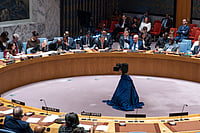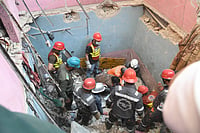It's no longer the proverbial land of milk and honey. Instead, Punjab has become the land of milk, more milk and tears. Thanks to the recently imposed wto regime, there has been a glut of imported butter oil and milk powder selling dirt-cheap in the markets of Punjab. In these times of laissez-faire, to talk about the pains of marginal and landless farmers engaged in small-scale dairy farming on the side can only amount to heresy. So, if the consumer in the state feels that he is god almighty, what with the entire dairy market feting him like nobody's business, what concern is it of anybody that the dairy farmers have no "buyers" for their produce? Even though the price of desi ghee has crashed from Rs 160 to almost Rs 100 a kg and that of milk powder from Rs 100 to Rs 60 a kg in a couple of years.
But this marked decline in demand for local dairy products is not just undermining the achievements of the great white revolution that the state has seen. It's slowly but surely strangling the cooperative dairy sector of the state to death.
The situation is grim if Amrik Singh, managing director of Milkfed, the milk producers' cooperative, is to be believed: "We have a stock of 2,500 tonnes of milk powder and 3,000 tonnes of desi ghee. And though we can manage these stocks, it will have an adverse effect on the health of the small cooperatives. Last year, we earned Rs 16.5 crore less on milk products compared to 1998-99 but this year, it may further go down to Rs 10 crore."
However, it's not the cooperative sector alone that needs to worry. In Punjab, there are several private companies, including some multinationals, which are in the dairy business. They too have cut down on their market procurement of milk because of the glut. Consequently, the pressure on the already overburdened cooperative sector has been further compounded as it's been forced to buy more milk than usual.
The acuteness of the crisis can be gauged from the fact that this year neither the Punjab government, nor the Chandigarh administration imposed the customary summer ban on using milk to make khoya and sweetmeats - this happens because milk production usually declines with the seasonal rise in temperature.
The fallouts of a liberal milk market are, however, unlikely to stay limited to Punjab. The Indian Dairy Association, which has about 90 lakh members throughout the country, are feeling threatened at this "unchecked invasion" of the Indian dairy sector by both the European Union (EU) and the US. The consequent damage control, or call it panic reaction if you will, has already begun. Says Punjab's finance minister Kanwaljit Singh: "We're really very upset and we have taken up the issue with the Union government, requesting it to impose customs and excise duty on both butter oil and milk powder to save the local producers. We want a minimum of 60 per cent import duty on these products."
The minister's reaction might sound a trifle alarmist, but things begin falling in place when one becomes aware of the fact that Punjab chief minister Parkash Singh Badal's unique project - dozen sheds with each shed having 10-15 imported cows giving high milk yield - for his native Kal Jharani village in Bhatinda district has not been spared by this wto-induced glut.
Says Punjab's director of dairy development B.M. Mahajan: "The Kal Jharani experiment had been doing very well. The Indian dairy sector in general and the one in Punjab in particular had started looking up during the past two decades but this sudden invasion, facilitated by a tax-free regime, has dealt a severe blow to this sector." He is of the opinion that unless both the Union and the state governments come out to support the local producers in some manner, it will be impossible to save the dairy industry.
It's by now a foregone conclusion that this virtual flood of milk that threatens to swamp the Indian market, after the tax barriers have come down, does not bode well for the economy. But that this is not a case of western economies being eager to provide the local consumer with 'superior' quality dairy products is equally clear. The state's finance minister says: "It's not as if the EU nations want to help us by providing cheaper products. They have a problem of surplus which they are trying to beat by dumping their excess products onto Indian and other third world markets."
Therefore, Mahajan and Co are not being illogical in their demand for "levying of an anti-dumping tax on imported milk products which have outmarketed and outpriced the local brands". Says Mahajan: "We have already moved the case and expect a formal notification very soon."
Though Punjab happens to be the principal turf where defences are being erected to stem a further invasion of foreign milk products, others who have jumped into the fray include the "Even Bangladesh protects its own"
National Dairy Development Board, the Indian Dairy Association and other cooperative bodies, including those in Gujarat (like Amul). These organisations have protested against giving a "free hand to the EU and the Americans to finish the Indian dairy sector".
But once again it's Punjab where this glut situation doesn't merely spell crisis but also puts chief minister Badal's prestige at stake. His populist plank rests on the much-trumpeted fact that he is a farmer.
What began as a crisis might just spiral out of control. Already, the milk cooperatives are demanding that the anti-dumping duty or customs duty on butter oil, milk powder and other milk products should be reimposed, and even that the quantitative restrictions (QRs) regime should be revived.
In the absence of official figures, the Indian Dairy Association has estimated that already 40,000 metric tonnes of imported butter oil and milk powder have landed up in India. Farmer Darshan Singh warns that the collapse of the entire Indian dairy sector is imminent if the government fails to take immediate steps to save the local farmers.
This is a warning that comes from a man who has his ears to the ground, in a country where dairying traditionally had a central place. The powers-that-be can only ignore it at their own peril and, of course, at the risk of enslaving its farmers.


























